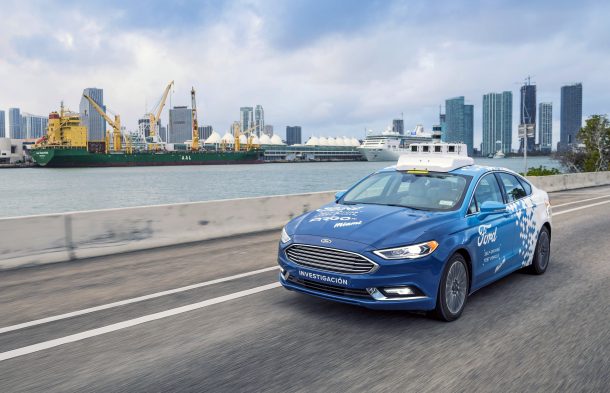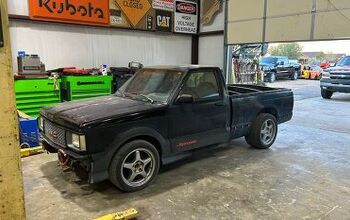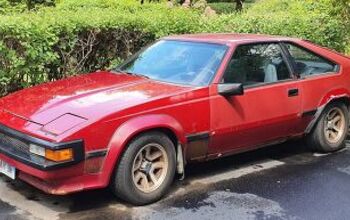Ford Keen on Ditching the Steering Wheel, Outlines Autonomous Vision

Ford Motor Co. recently released a 44-page report, entitled “ A Matter of Trust,” which clearly states its vision of the autonomous future the tech industry’s attempting to stuff down our collective throats. The file covers Ford’s overall philosophy on self-driving vehicles, a milestone timeline, answers frequently asked questions, and states what the company intends to do over the next couple of years.
While we applaud any automaker that takes the initiative to craft a comprehensive report detailing what they’re plotting, we can’t say we’re enthralled with what we’ve read.
A large portion of the report focuses on giving a general idea of how autonomous vehicles function, what they’ll have to cope with, and answering difficult questions in a frank and honest manner. But Ford also said it intends to launch an AV in 2021 that lacks a steering wheel or pedals. We weren’t happy hearing about General Motors’ development of a car without driver controls back in January and nothing has changed our minds since then.
“…our self-driving vehicles will operate without the need for a driver,” reads the report. “In fact, the purpose-built self-driving vehicle we plan to introduce in 2021 is designed to operate without a steering wheel, gas or brake pedals. We can do this because we’re applying the technology in the way it is designed to operate, such as using self-driving vehicles for a ride-hailing service within a specifically-defined area of a city and only when the weather is good enough for the sensors to work properly.”
Ford’s paper is eerily similar to GM’s Self-Driving Safety Report. Both seem to serve primarily as ways to reassure the NHTSA that the automakers are committed to safety above all else while giving a general idea of their business model and the associated technology. The pair intend to utilize autonomous technology for commercial fleets first, then roll AVs out to the general populace. But Ford clearly noted it wasn’t in a competition to see which company would first cross the finish line with a self-driving model.
“We are not in a race to be first to offer self-driving vehicles to the public,” Ford said. “Our focus is on doing it correctly”
Whether that’s because most analysts seem to agree that GM is slightly ahead in that non-race or simply because Ford cares more about safety is irrelevant. Ford is right; rushing this tech would be a big mistake. People’s lives are at stake and every mishap involving advanced driving systems fills headlines — leading to public distrust of the technology.
In the doc’s Q&A section, the automaker addressed the incident where one of Uber’s self-driving test vehicles struck and killed a pedestrian.
“Any death on the road is terrible news,” Ford said. “And the recent accident involving a self-driving test vehicle has raised serious questions for all of us working in the field. We are confident in our safety processes and procedures, which we’ve refined over decades of engineering and testing the vehicles we manufacture. We follow our proven safety strategies, including extensive computer simulations and driving on closed-course tracks, before we allow any self-driving test vehicles on public roads. ”
It also explained that its test drivers are highly trained and only ever operate in teams of two. While that’s supposed to make us feel better, it’s really only the driver who has to drop the ball for tragedy to occur. We also know that the mere existence of advanced driving aids automatically make a driver passive and less alert, while dulling their skills. That’s probably the best argument for remove the steering wheel and pedals. But it also illustrates the dangers of an autonomous system that’s anything less than perfect.
Another safety concern revolves around automotive data. We already know Ford and GM want to capture consumer data for sale to third parties and proprietary in-car applications, but they also need it to hone the skills of self-driving vehicles. Either way, automaker have to implement full-time connectivity to keep the data flowing. But that opens up cars and customers to potential vulnerabilities.
“Ford has sought to mitigate these inherent vulnerabilities by building security into the heart of our System Safety process,” the report reassured. “Our cybersecurity strategy extends not only to the vehicles’ electronics, sensors and Virtual Driver System but also to any feature connected to them, such as data ports, mobile apps and customer service systems.”
In an impressive bit of candor, the automaker acknowledges there is no such thing as perfect security. Ford promised to simply do its best and take every precaution to ensure a safe exchange of digital information.
There’s more, including interesting studies conducted on how the public interacts with autonomous vehicles (we recommend you check it out). Overall, we like Ford’s approach to AVs more than most other automakers, as the automaker’s more or less a straight shooter. And it appears Ford’s looking at the issue from all angles. Still, it represents a push towards a future we’re not incredibly fond of — and one that half of the public seems skeptical of.
[Image: Ford Motor Co.]

A staunch consumer advocate tracking industry trends and regulation. Before joining TTAC, Matt spent a decade working for marketing and research firms based in NYC. Clients included several of the world’s largest automakers, global tire brands, and aftermarket part suppliers. Dissatisfied with the corporate world and resentful of having to wear suits everyday, he pivoted to writing about cars. Since then, that man has become an ardent supporter of the right-to-repair movement, been interviewed on the auto industry by national radio broadcasts, driven more rental cars than anyone ever should, participated in amateur rallying events, and received the requisite minimum training as sanctioned by the SCCA. Handy with a wrench, Matt grew up surrounded by Detroit auto workers and managed to get a pizza delivery job before he was legally eligible. He later found himself driving box trucks through Manhattan, guaranteeing future sympathy for actual truckers. He continues to conduct research pertaining to the automotive sector as an independent contractor and has since moved back to his native Michigan, closer to where the cars are born. A contrarian, Matt claims to prefer understeer — stating that front and all-wheel drive vehicles cater best to his driving style.
More by Matt Posky
Latest Car Reviews
Read moreLatest Product Reviews
Read moreRecent Comments
- Redapple2 I ve slept on it. I would take one on a 3 yr lease for $199/mo- ($1000 down total). Evil gm Vampire gave me this deal in 2012.
- 3SpeedAutomatic Would prefer a non-turbo with a stick shift. That would be more fun to drive!!🚗🚗🚗Also, I could teach my nieces and nephews to drive a standard. You'd be surprised how many folks can't handle a stick shift today. Yet, in Europe, most rental cars come with a stick unless you specify otherwise.
- Jeffrey Henry Ford said about innovation, “ If I had asked my customers what they wanted, then they would have said a faster horse." Change is inevitable!!!https://www.wri.org/insights/countries-adopting-electric-vehicles-fastest#:~:text=Currently%2C%2016%20countries%2C%20including%20Canada,create%20and%20enforce%20such%20policies.
- ToolGuy If these guys opened a hotel outside Cincinnati I would go there to sleep, and to dream.
- ToolGuy Michelin's price increases mean that my relationship with them as a customer is not sustainable. 🙁


































Comments
Join the conversation
“And the recent accident involving a self-driving test vehicle has raised serious questions for all of us working in the field. We are confident in our safety processes and procedures, which we’ve refined over decades of engineering and testing the vehicles we manufacture. We follow our proven safety strategies, including extensive computer simulations and driving on closed-course tracks, before we allow any self-driving test vehicles on public roads. ” THIS is the major difference between a legacy automaker developing autonomous tech and newer companies like Tesla, Uber, etc. The decades of institutional knowledge and well developed R&D procedures. Automakers need to put new focus on crash structures. So far the major crashes with autonomous driving tech has been the inability of the vehicles to recognize an obstruction and brake, so we will be seeing more crashes at full velocity, where a human driver -even distracted - would at least have attempted to brake at the last second.
There is a future for smaller autonomous vehicles. Small and sleek enough for the person behind the steering wheel to still have a feel for the vehicle's outer dimensions. Cause that person will be responsible for a very-very long time to come. Also small/sleek enough to be able to nimbly evade other road users, particularly the weaker ones in dense city traffic. Expecting SUVs, which already tend to isolate the driver from the whole driving experience, to self-drive is just asking for trouble.